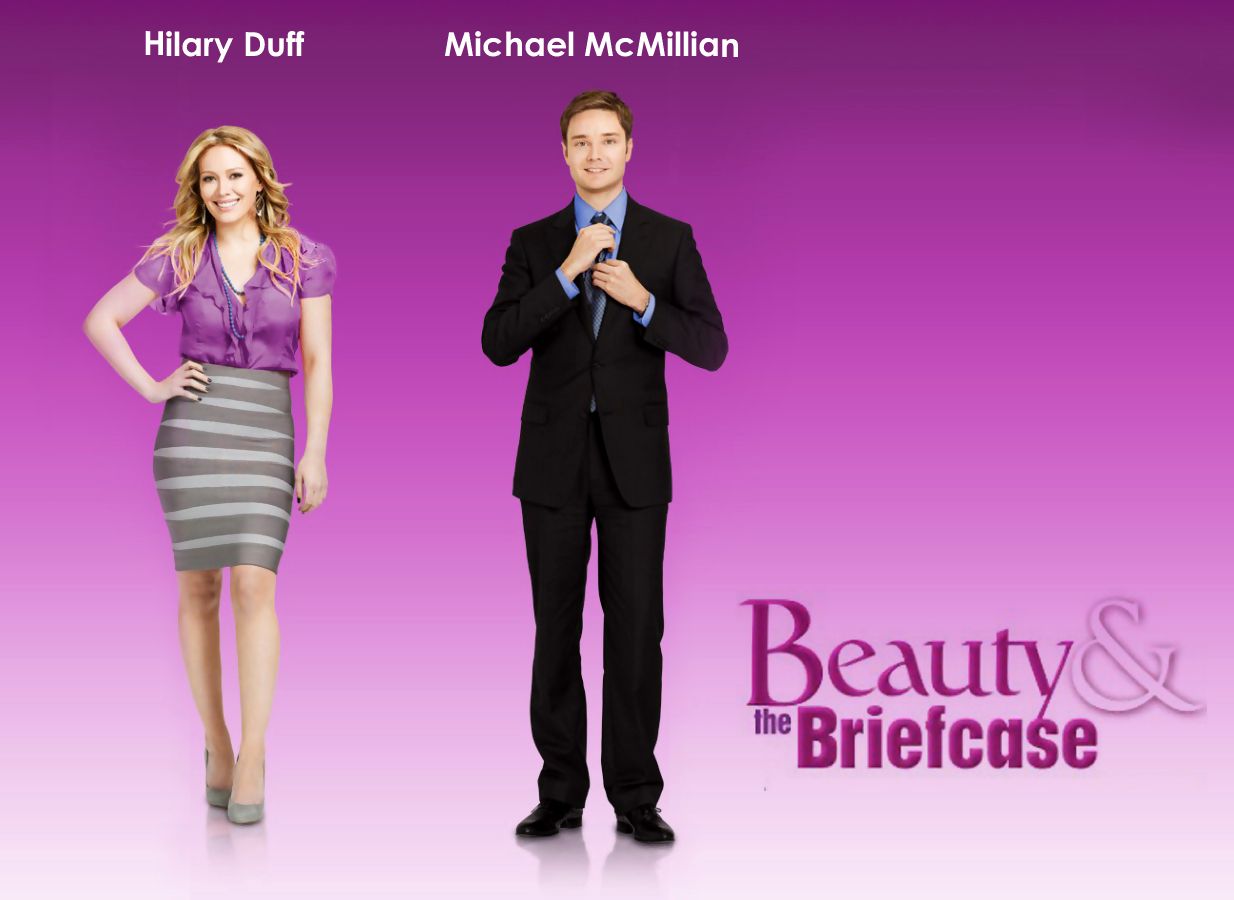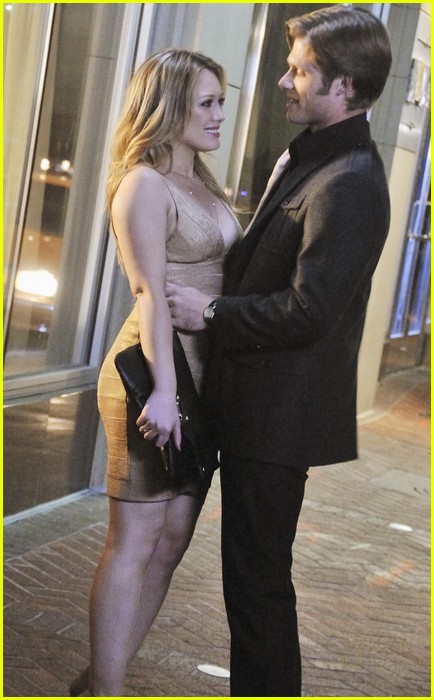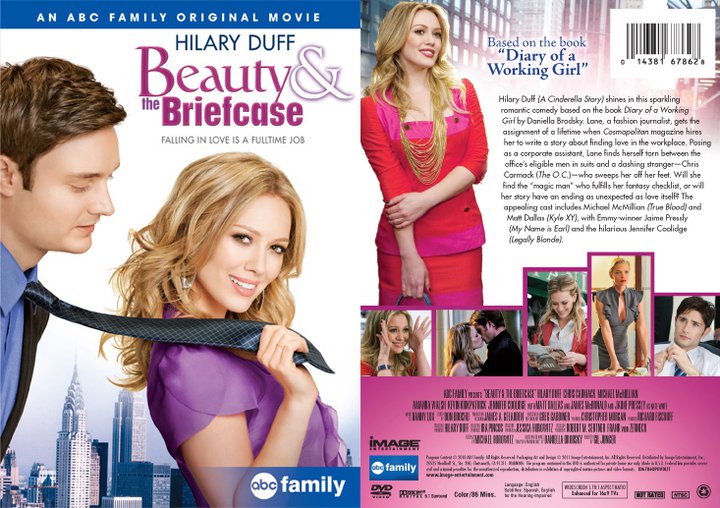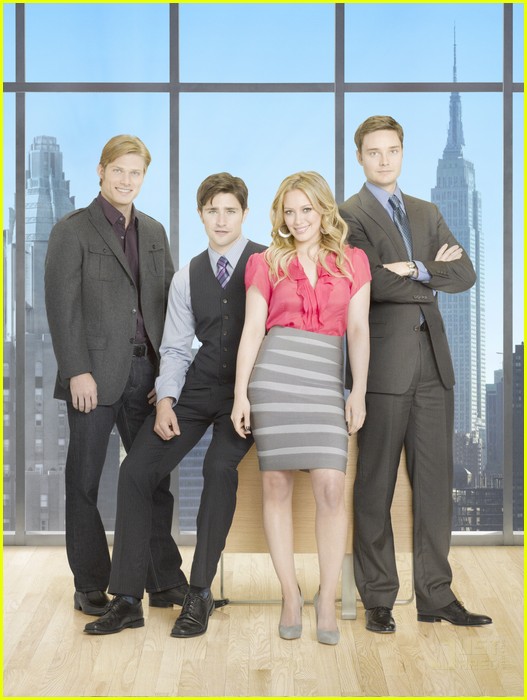Today's Random-Ass Rerun of the day is the 2010 Hilary Duff Vehicle Beauty & the Briefcase
Name a more iconic duo!
Welcome to the eleventh entry in Control Nathan Rabin 4.0. It’s the column where I let patrons who make a one time one hundred dollar pledge to the Patreon for this website choose a movie that I must then watch and write about it. The feature had worked out splendidly so far, in part because it allows me to out-source the essential work of finding ridiculous shit to write about to readers and discover the kind of hot garbage I never would have even contemplated covering.
This feature is empowering me to explore campy, kitschy, unlikely parts of the pop culture world I’ve never written about before, like the simultaneously generic and fascinatingly specific realm of ABC Family romantic comedies like 2010’s The Beauty & The Briefcase, a Hillary Duff vehicle that represents the product of an unholy alliance between ABC Family and Cosmopolitan, which has been serving an invaluable purpose in providing tips on how to drive your man wild in bed since 1965.
Yes, Cosmopolitan has been around for over half a century. So why does Beauty & The Briefcase feel like it was written in the decade before Cosmopolitan’s founding, when the role of single girls in business, as far as the pop culture of the era was concerned, was to flirt with the boss en route to marrying him or wiggling around in tight outfits as secretaries/mistresses?
The kindly patron who brought this exquisitely terrible movie into my world offered me a choice between it and 2015’s The Spirit of Christmas, a ghost-themed Christmas romance that premiered on Lifetime. Supernatural Yuletide movies are tough to pass up, but like everyone, I gravitate towards pop culture about worlds I know or have known.
I love movies about the media because, with the exception of something like Shattered Glass or All the President’s Men, both of which have the advantage of being docudramas about true stories, they almost never get either the details or the grand gestalt right.
Movies and television shows don’t just get things a little bit wrong. No, they get everything egregiously, ridiculously, insultingly, wonderfully, terribly incorrect. They occupy a bizarre fantasy world of money and prestige and endless drama, where, in this particular instance, the fate of an entire issue of Cosmopolitan hinges on an air-headed neophyte writer who has one published professional article composing a meaty cover story that requires her to get a good-paying job at a business and fall genuinely in love with one of over a dozen men she’s been ordered to see casually. For the sake of one fucking article! Honestly, there are small wars that require less orchestration, deception, and work than the creation of this one fucking article, which is rooted in the kind of deception that’s supposed to come off as quirky and fun but instead seems vaguely psychotic, the work of a pink frilly sociopath willing to do anything—up to and including murder—to achieve her life’s dream of landing a cover story on Cosmopolitan.
As evidenced by this sad little sideshow comparing the reel life of Hillary Duff’s ambition-blinded sociopath from the real life of Cosmopolitan employees, Cosmopolitan cooperated in the filming of this unintentionally hilarious anti-feminist nightmare, but it ends up making both its employees and readers seem not just terrible but unethical and unhinged.
In Beauty & The Briefcase, Hillary Duff plays Lane Daniels, which sounds like a shady law firm and a high-end catalog. As she states over and over in narration that makes her character seem like a lobotomized Carrie Bradshaw with a pink glitter bomb where her brain should be, Lane Daniels loves Cosmopolitan more than anything else in the world, with the possible exception of hot sex with hunky guys, dishing with girlfriends over a pint of Ben & Jerry’s and basically behaving like a regressive caricature of a sex bomb concerned only with getting her MRS degree and a whole lot of adorable, expensive shoes in the bargain.
It was awfully progressive of them to cast an African-American actor as the gentleman leering at the heroine's body.
Daniels is depicted as the ultimate Cosmopolitan gal. And what is a Cosmopolitan gal, according to this adaptation of Daniella Brodsky’s novel? Well, she has the mindset of a 1950s single gal. She understands intuitively that the greatest accomplishment any woman can aspire to is to land a halfway decent man to whom she can then devote her life. She doesn’t know anything about numbers or figures and could care less about organizational charts or “statistics” but is worked up into a nearly orgasmic state of hyper-arousal at being in the mere presence of attractive men in suits.
She’s fundamentally dishonest, willing to lie extensively and participate in an elaborate charade solely for the sake of her nascent journalism career, and when she enters the public, traditionally male space of the investment banking firm where she’s embedded herself, she views the other women working there solely through the lens of romantic competition. Since Lane is ready, even eager, to flirt outrageously with all of her male coworkers while wearing tight-fitting outfits, she’s not too worried.
Ah, but we are getting ahead of ourselves. Beauty & the Briefcase opens with Lane living the frustrating life of a single gal, fashion maven and aspiring freelance writer in the big city. On the basis of the heat for a freelance article she wrote about shoes for Her Style, Lane improbably scores a face-to-face pitch meeting with Kate White (Jamie Pressley), the intimidating editor of Cosmopolitan.
I know, like Lane knows, that that first published piece is like smoking crack rock: you immediately get hooked and you won’t stop until you get that next fix.
Kate says no to primo pitches about whether boyfriend jeans require a boyfriend and what Lane refers to as “statement dresses,” but when Kate is walking Lane out of the building, they immediately bond over being unbelievably hot sex bombs who nevertheless can’t find a decent man to date or marry and come up with a pitch as impossibly involved as it is impossible to execute. Lane will get a job at a business despite a complete lack of relevant experience or even the fuzziest interest in the business world as anything other than a target-rich breeding ground for her endless, fruitless search for Mr. Right, and then begin the process of dating eligible coworkers so that she can deliver a dishy expose on this hot new trend of, uh, women dating business guys in suits?
That seems like a bit of a wobbly, vague, impossible pitch that’s also insultingly terrible but Kate goes for it all the same to the point where when Lane begins to have second thoughts, she tells her non-employee that she better go out and date at least twelve coworkers for the sake of a story she is being forced to write, even when does not want to.
When an editor orders you to grab drinks and get frisky with a dozen male coworkers in suits over a week-long span, that’s not being a hands-on boss; that’s being a madam.
By lying about how she totally knows about business and math and stuff, and not just what the hottest fashions are that season, Lane gets a job at an investment firm under Tom Rinehart (Michael McMillian). In the best possible version of this story, the one that doesn’t premiere on ABC Family but rather on tens of thousands of screens worldwide, Tom is played by Colin Firth. That casting alone would broadcast that, despite his awkwardness, unfashionableness, and self-consciousness, he’s a good guy underneath and the stodgy, not sexy provider the heroine should end up with instead of the sexy guy who fills her life with chocolate-fueled sexcapades but cannot be trusted.
That role here is occupied by Chris Carmack, an underwear model-looking ass motherfucker who plays Liam, a fantasy figure of dreamy British hunkiness who pops up unexpectedly in Lane’s life, somewhat inconveniently not clad in a businessman’s requisite suit and appears to be much too good to be true because dudes like him in movies like these invariably are. In the A-list version of Beauty & the Briefcase (which, of course, would have a title way less shitty than Beauty & the Briefcase) the character would be played by Hugh Grant while Lane would be played by someone like Alice Eve.
Men in suits are supposed to be Lane’s big turn on but Duff overplays this attraction to nearly pornographic effect. She’s so turned on she seems on the verge of taking random coworkers into empty rooms so she can jerk them off two at a time. In the #MeToo world of 2018 Beauty & The Briefcase feels less like an apologia for office place sexual harassment than a vigorous endorsement of sexual harassment as the perfect way to score the businessman of your dreams. And if he also happens to be your boss, so much the better! That's what the film considers a twofer!
Beauty & the Briefcase never seems more than a minute or so away from devolving or evolving into a full-on porn film. In one typically queasy-making sequence, Lane’s very serious, sober-minded boss, who has a girlfriend until it’s time for him to predictably and annoyingly not have one, is having a teleconference call with an African-American client, and Lane is hilariously and distractingly bumbling around in the background in a tight miniskirt, bending over repeatedly in ways that cause the potential client ogling her behind to make several spoonerisms related to her ass.
This scene serves a purpose beyond affording the film’s overwhelmingly female audience a long opportunity to leer at Duff’s posterior in tight skirts. We can see in this moment that Tom is, for the first time, seeing her not as a woman who lied extensively on her resume and claimed to have all manner of skills and experience that she does not possess to get a job she’s unqualified for, but rather as the movie sees her: as a sweet piece of ass who’d look perfect smiling proudly on the arm of the right handsome, sexy and debonair husband.
Beauty & the Briefcase is like Clueless or Legally Blonde if, under their fizzy, dizzy, superficial exteriors, the heroines of those films were, if anything, even fizzier and dizzier and more superficial underneath. Beauty & the Briefcase mainly depicts its protagonist as an amoral airhead concerned only with Cosmopolitan, fashion, and hot guys, but in the third act, she discovers an unlikely, if inevitable, idiot-savant gift for at least one aspect of the business world, a realm vaguely and hilariously referred to only as “Visuals.”
This ridiculous fluff is so backward that even Lane’s’ unlikely business gift has to be gendered. She can’t discover a flair for numbers or statistics, heaven forbid. No, we learn that she has become skilled at “Visuals” (even the businessman who earlier ogled her rear end via Skype acknowledges her mastery of the field), which I imagine means she’s good at putting glitter and rainbow stickers on the company’s annual report.
Beauty & the Briefcase is so relentlessly sexist in an old-fashioned way that it could double as Men’s Rights propaganda. The movie’s Neanderthal gender politics support the idea that the only space women occupy in the business world is as eye candy and/or sexual partners for wealthy alpha males, that what women decry as “sexual harassment” is just good, innocent, sexy fun between consenting coworkers and that everything women like Lane do professionally, from the outfits they wear to the flirtatiousness of their banter, is designed to seduce and keep a wealthy, powerful man.
Beauty & the Briefcase is a fucking horror show. It occupies a crazy time warp where feminism never happened, and every woman’s goal is to ensnare a good-looking dude with a well-paying job in their man-trap and then keep him there by pumping out babies. I watched it because I expected and hoped that it would be the worst, most insulting and ridiculous depiction imaginable of both working in the media and falling in love. I was not disappointed. I wanted Beauty & the Briefcase to be utter trash, but it’s even more garbagey than I could have ever imagined, and I mean that as high praise after a fashion.
Nathan needed expensive, life-saving dental implants, and his non-existent dental plan didn’t cover them, so he started a GoFundMe at https://www.gofundme.com/f/support-nathans-journey-to-dental-implants. Give if you can!
Did you enjoy this article? Then consider becoming a patron here.







